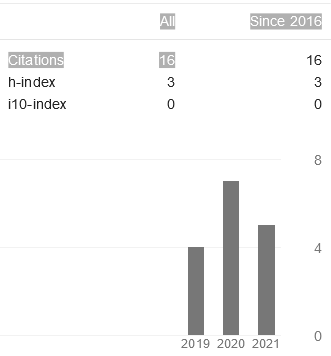School Climate, Emotional Intelligence And Students' Verbal Aggression Behavior
Abstract
The phenomenon of aggressive behavior often occurs in Indonesia and is experienced by teenagers. This is almost always presented from various reports from various media. Information about aggressive behavior of teenagers such as hostility, swearing, robbery, murder, and many other cases. Verbal aggression is a very worrying phenomenon because humans basically need each other in their social life every day, frequent acts of verbal aggression make this behavior reasonable and even considered as having no serious impact.The purpose of this study was to determine the relationship between School Climate and Emotional Intelligence with Verbal Aggressive Behavior. This research is a quantitative research with a correlation type. Data collection techniques in this study were in the form of the School Climate scale, the Emotional Intelligence scale and the verbal aggression scale. the subjects in this study were vocational students and the number of subjects in this study amounted to 189 people. The data analysis technique used in this study is Spearman's Non-Parametric Rank analysis. Based on the results of data analysis, the following results were obtained: 1) there was a significant negative relationship between School Climate and Verbal Aggression (-.344 and p = 0.000; p <0.01). 2) there is a significant negative relationship between Emotional Intelligence and Verbal Aggression (-.271 and p = 0.000; p <0.01). The results of this study concluded that each variable of school climate and emotional intelligence had a very significant relationship with aggressive verbal. But the two variables are not simultaneously associated with verbal aggression.
Copyright (c) 2023 Yefta Luji Wara, Suryanto, Dyan Evita Santi

This work is licensed under a Creative Commons Attribution-ShareAlike 4.0 International License.
Authors who publish with us agree to the following terms:
- Authors retain copyright and grant the publisher right of first publication with the work simultaneously licensed under a Creative Commons Attribution License that allows others to share the work with an acknowledgement of the work's authorship and initial publication in this proceeding.
- Authors are able to enter into separate, additional contractual arrangements for the non-exclusive distribution of the proceeding's published version of the work (e.g., post it to an institutional repository or publish it in a book), with an acknowledgement of its initial publication in this proceeding.
- Authors are permitted and encouraged to post their work online (e.g., in institutional repositories, pre-prints sites or on their website) prior to and during the submission process, as it can lead to productive exchanges, as well as earlier and greater dissemination of published work





_page-00011.jpg)
